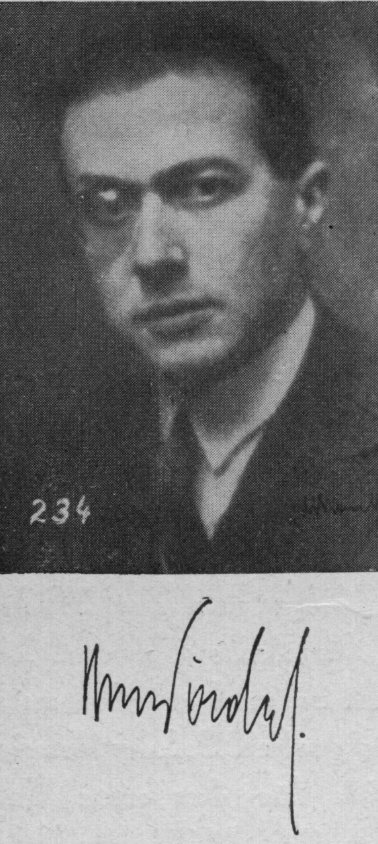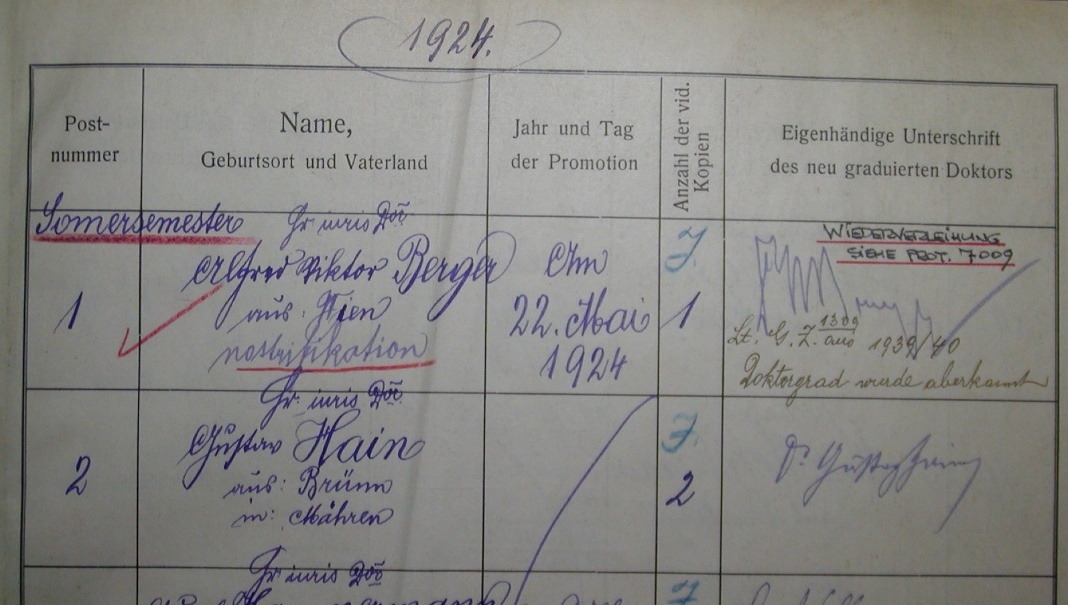Alfred Viktor Berger - Vösendorf
| Born: |
01-09-1901 |
| Faculty: |
Law School |
| Category: |
Deprivation of academic degree |
Alfred Viktor BERGER, later: BERGER-VOESENDORF (born on 9
th, 1901 in Vienna, died on May 27
th, 1980 in Washington, D.C./USA), had graduated at the University of Breslau in 1922 and had nostified the academic degree "Dr. iur." at the Law School of the University of Vienna in 1924; in 1941 he was deprived of the academic degree for racist and political reasons.
Alfred Viktor Berger, who later became a national economist, political scientist, economist and lawyer, was the son of Kommerzialrat Isidor Robert Berger (1858-1942, manufacturer ["Belko" Wien-Voesendorfer Genussmittelwerke Berger, Volk & Co.]) and his wife Louise Berger (née Pichler, 1871-1942), both of whom left the Vienna Jewish Community in December 1916 and were baptized Roman Catholic, presumably also Alfred Berger, as his older brother Oscar (born 1892) had already been baptized Roman Catholic in 1898.
Alfred Berger passed his school-leaving examination in Vienna and founded the
Academic Association of Old Austria as early as 1918 and became its president. He graduated from the old
Vienna Commercial Academy from 1919 to 1920 and at the same time began to study law, politics and economics as an extraordinary student at the Law School of the University of Vienna in the spring term of 1919. He then studied as a regular student in Austria at the Universities of Vienna and Graz and in Germany in Munich, Berlin and Breslau [today: Wrocław, Poland] with Josef Schumpeter, Werner Sombart and Hans Kelsen, among others.
He received his doctorate in law from the
University of Breslau in 1922, went to Rio de Janeiro for a year in early 1923 as an attaché to the
Austrian Consul General, and had his doctorate, which he had earned in Germany at the
University of Breslau, nostrified into a "domestic doctorate" at the
University of Vienna on May 22
nd, 1924.
From 1924 to 1938 he was active as a journalist, economist and political advisor - politically he was active in the conservative and monarchist-legitimist movement and later also in the Austrofascist
Vaterlaendische Front. From 1931 he is admitted to the bar in Vienna and specializes in trade and balance of payments and foreign trade policy. In 1932 he changes his surname to "Berger-Voesendorf" and continues to work as an international industrial consultant in the Middle East, is a participant in the
Austrian Official Conference on Foreign Trade, and is head of research at the
Economics Institute of the Vienna School of World Trade [today:
Vienna University of Economics and Business]. He founds the
Conservative-Social Working Group and worked out a program for a conservative corporative-monarchist future for Austria, heads the legal-economic and political department of the
Vaterlaendische Front 1936-1938, and lectures regularly at the Catholic
Leo Gesellschaft.
Before the expected reprisals as an Austrofascist functionary and converted Jew, he emigrated the night before the
Anschluss with the help of the
Catholic Aid Committee on March 11
th/12
th. From July 1938 he taught trade policy and finance at the
University of Utrecht/The Netherlands as an unsalaried lecturer, and in the same year, under the patronage of Professor Verrjn Stuart, he "habilitated"/qualified as a professor of economics and, in order to finance his livelihood, also managed the foreign banking operations of
Crédit Général Domestique in Brussels.
He tried to form an
Austrian Legion within the French Army and participated in attempts of Martin Fuchs and Hans Rott to establish an Austrian government-in-exile and was called in by the Polish government-in-exile as an advisor in political and economic matters to prepare for the development of a post-war order in the Central European Danube region.
As early as April 1938, he had asked Leo Gross, the former colleague of Hans Kelsen in Cologne, to approach the
Society for the Protection of Science and Learning on his behalf to obtain a position in Great Britain, and he also asked Leo Hayek, his "compatriot and fellow student," for mediation, but he was unwilling to help him.
Faced with the threat of occupation of the Netherlands, Berger-Voesendorf, with no prospect of a position, nevertheless traveled to Great Britain in August 1939 on a visitor's visa. His points of reference and networks in England, however, were too little anchored, mostly emigrated Austrians of monarchist circles such as Count Huyn and ex-Archduke Robert Habsburg, or professional colleagues such as Leo Hayek and Richard Schüller, who were rather distant from him and could not or would not help him further. He was interned as an
enemy alien soon after the outbreak of World War II in April 1940 and was immediately taken to Canada and imprisoned for almost four years (from 1943 again in England on the Isle of Man) and only released from internment in February 1944.
During this time he was deprived of his German citizenship by the
Third Reich for racial and political reasons on July 2
nd, 1940, and all his assets were confiscated (announcement in the
German Reichsanzeiger on July 4
th, 1940), whereupon he was also deprived of his doctorate at the University of Vienna on May 8
th, 1941, since according to the criteria of National Socialism he was considered as a Jew and as "unworthy of an academic degree from a German university."
His parents had been unable to flee Austria in time and, after their expropriation and forced resettlement, they were deported on June 28
th, 1942 from the collective apartment in Vienna's 2
nd district, Schoenererstrasse [Heinestrasse] 30/16 to Theresienstadt [Terezin, Czech Republic], where his father perished shortly thereafter on July 30
th, 1942, and his mother was further deported on September 23
rd, 1942 to the concentration camp Treblinka [Poland] and murdered there.
After the end of the Second World War, Alfred Victor Berger-Voesendorf continued to lecture for one term in International Trade Studies at the
University of Oxford. In 1946 he was not yet able to take up a teaching position in the USA at
Sterling College in Kansas, as the Austrian quota for the USA had not yet been fixed at that time and he was therefore refused a US visa. However, he was appointed to a professorship in Egypt in the same year and he headed the economics department of
Farouk University in Alexandria there until 1948.
At the same time, he was a financial and economic advisor to developing countries in Asia, Africa and South America. He was also active in the
United Nations and the
International Bank for Reconstruction and Development. Berger-Voesendorf entered the U.S. permanently in 1948, arriving by plane in New York City, NY, on October 20
th, 1948, immediately applying for U.S. citizenship (since 1940 he ws stateless) and teaching at
Gonzaga University in Spokane, Washington, 1948-1953, a year in Colombia in 1953, at the
Universidad de los Andes in Bogotà, then again in the U.S.: 1954-1956 at
La Salle College in Philadelphia and 1956-1959 at
Georgia State College Of Business Administration in Atlanta. 1965-1968 he was Professor of Economics and Finance at
Sacred Heart University in Bridgeport, Connecticut.
His scholarly works include
Der Einfluss des geltenden Steuerrechts auf die Produktion (Breslau 1922),
Der leitende Wirtschaftsbeamte (Vienna 1926),
Die Entwicklungstendenz der modernen Handelspolitik. Der Weg zum Schutzhandel (Berlin 1932),
Das Staatsprogramm des sozialen Konservatismus in Oesterreich (Vienna 1938),
The Real Face of the Political Emigration from Germany (London 1945),
The Pathology of Foreign Trade (Alexandria 1947),
An Analysis of the Mixed Economy using the Sub-Model Technique (Washington, D.C., 1952).
He was a member of the
American Economic Association and the
Royal Economic Society; he was awarded a
Medal of Honor by the Republic of France.
Alfred Viktor Berger-Voesendorf died in Washington, D.C., on May 27
th, 1980; his ashes were interred in the family grave at the city cemetery in Baden, Lower Austria, on July 10
th.
It took 62 years since the deprivation - and a very long time since the end of Nazism - until the regranting of the doctorate took finally place on April 10
th, 2003 posthumously in a solemn ceremony and was declared "void from the beginning".
Lit.: Archive of the University of Vienna/enrollment forms ("Nationale") IUR 1919-1923, graduation registry ("Promotionsprotokoll") IUR 1924–1939 Nr. 1, rectorate GZ 1309 ex 1939/40, GZ 1196 ex 1939/40, GZ 1245 ex 1939/40, GZ 140 ex 2002/03; Austrian State Archives (OeStA)/Archive of the Republic (AdR) E-uReang/VVSt/VA Buchstabe B 281, E-uReang/VVSt/Gew. 2134, E-uReang/AHF/B Berger-Voesendorf, BKA/BKA-I/BPDion Wien/VB/Signatur XVIII 10649; Deutscher Reichsanzeiger from July 4, 1940; Die Presse, July 8, 1980, p. 4; American Men & Women of Science 1973/12. edition, 1978/13. editin; ROEDER 1983, 87f.; FEICHTINGER 2001, 234-237; POSCH/STADLER 2005; POSCH 2009, 274, 393; SAUER/REITER-ZATLOUKAL 2010, 88.
Herbert Posch

